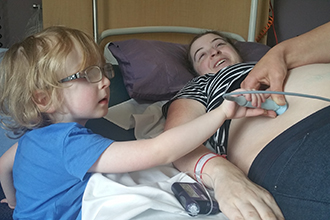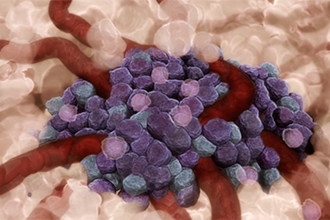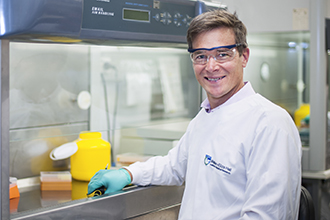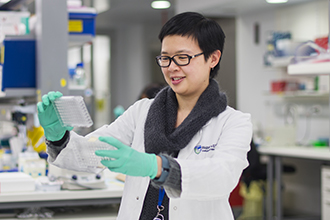Bediaga NG, Garnham AL, Naselli G, Bandala-Sanchez E, Stone NL, Cobb J, Harbison JE, Wentworth JM, Ziegler AG, Couper JJ, Smyth GK, Harrison LC (2022) Cytotoxicity-related gene expression and chromatin accessibility define a subset of CD4+ T cells that mark progression to type 1 diabetes. Diabetes 71(3):566-577. doi: 10.2337/db21-0612. PMID: 35007320.
Allnutt, T, Roth-Schulze AJ, Harrison LC (2021) Expanding the taxonomic range in the fecal metagenome. BMC Bioinformatics 22(1):312. doi: 10.1186/s12859-021-04212-6.
Roth-Schulze AJ, Penno MAS, Ngui KM, Oakey H, Bandala-Sanchez E, Smith AD, Allnutt TR, Thomson RL, Vuillermin PJ, Craig ME, Rawlinson WD, Davis EA, Harris M, Soldatos G, Colman PG, Wentworth JM, Haynes A, Barry SC, Sinnott RO, Morahan G, Bediaga NG, Smyth GK, Papenfuss AT, Couper JJ, Harrison LC on behalf of the ENDIA Study Group (2021). Type 1 diabetes in pregnancy is associated with distinct changes in the composition and function of the gut microbiome. Microbiome 9(1):167. doi: 10.1186/s40168-021-01104-y.
Bediaga NG, Coughlan HD, Johanson TM, Garnham AL, Naselli G, Schröder J, Fearnley LG, Bandala-Sanchez E, Allan RS, Smyth GK, Harrison LC (2021). Multi-level remodelling of chromatin underlying activation of human T cells. Sci Rep 11(1):528. doi: 10.1038/s41598-020-80165-9. PMID: 33436846.
Wentworth JM, Bediaga N, Geyer S, Gitelman S, Evans-Molina C, Gottlieb P, Colman PG, Haller M, Harrison LC (2020). Clinical trial data validate the C-peptide estimate model in type 1 diabetes. Diabetologia 63(4):885-86. doi: 10.1007/s00125-020-05088-6. PMID: 31982961.
Shathili AM, Bandala-Sanchez E, John A, Goddard-Borger E.D, Thaysen-Andersen M, Everest-Dass A, Adams TE, Harrison LC (co-senior author), Packer NH (2019). Specific sialoforms required for the immunosuppressive activity of human soluble CD52. Front Immunol 10:1967. doi: 10.3389/fimmu.2019.01967.
Harrison LC, Perrett KP, Jachno K, Nolan TM, Honeyman MC (2019). Does rotavirus turn on type 1 diabetes? PLoS Pathogens 15(10): e1007965.doi.org/10.1371/journal.ppat.1007965.
Wentworth JM, Bediaga NG, Giles LC, Ehlers M, Gitelman SE, Geyer S, Evans-Molina C, Harrison LC; Type 1 Diabetes TrialNet Study Group; Immune Tolerance Network Study Group (2019). Beta cell function in type 1 diabetes determined from clinical and fasting biochemical variables. Diabetologia 62(1):33-40. PMID: 30167735.
Perrett K, Jachno K, Nolan, Harrison LC (2019). Association of rotavirus vaccination with the incidence of type 1 diabetes in children. JAMA Pediatr 173 (3):280-82. doi: 10.1001/jamapediatrics.2018.4578. (Erratum in: JAMA Pediatr 2019 Jul 15) PMID: 30667473.
Bandala-Sanchez E, Bediaga NG, Goddard-Borger ED, Ngui K, Naselli G, Stone NL, Neale AL, Pearce LA, Wardak A, Czabotar P, Haselhorst T, Maggioni A, Hartley-Tassell LA, Adams TE, Harrison LC (2018). CD52 glycan binds the pro-inflammatory B box of HMGB1 to engage the Siglec-10 receptor and suppress T-cell function. Proc Natl Acad Sci (USA) 115(30):7783-88. PMID: 29997173.
Zhang Y, Maksimovic J, Huang B, Naselli G, De Souza DP, Chen H, Zhang L, Weng K, Liang H, Xu Y, Wentworth JM, Huntington ND, Oshlack A, Gong S, Kallies A, Vuillermin P, Yang M, Harrison LC (2018) Cord blood CD8+ T cells have a natural propensity to express IL-4 in a fatty acid metabolism and caspase activation-dependent manner. Front Immunol 9:879. doi: 10.3389/fimmu. 00879. PMID: 29922282.
Rashidi M, Bandala-Sanchez E, Lawlor KE, Zhang Y, Neale AM, Vijayaraj S, O’Donoghue R, Adams TE, Wentworth JM, Vince JE, Harrison LC (2018). CD52 inhibits Toll-like Receptor activation of NF-B and triggers apoptosis to suppress inflammation. Cell Death Diff 25(2):392-405.
Wentworth JM, Zhang J-G, Bandala-Sanchez E, Naselli G, Liu C, Ritchie M, Smyth GK, O’Brien PE, Harrison LC (2017). Interferon-gamma secreted from omental adipose tissue of insulin-resistant humans impairs adipocyte morphology and function. Int J Obesity 41:1782-1789. PMID: 28769120.
Marino E, Richards JL, McLeod KH, Yap YA, Stanley D, Kranich J, McKenzie C, Oliveira AC, Mason L, Rossello FJ, Balasubramanian Krishnamurthy, Nefzger C, Macia L, Thorburn A, Baxter AG, Morahan G, Wong L, Polo JM, Moore RJ, Lockett TJ, Clarke JM, Topping DL, Harrison LC, Mackay CR (2017) Gut microbial metabolites limit autoimmune T cell frequencies and protect against type 1 diabetes. Nature Immunology 18:552-62. PMID: 28346408.
Zhang Y, Collier F, Naselli G, Saffery R, Tang ML, Allan KJ, Ponsonby A-L, Harrison LC (co-senior author), Vuillermin P (2016). Cord blood monocyte-derived inflammatory cytokines suppress IL-2 and induce non-classic ‘Th2-type’ immunity associated with development of food allergy. Sci Trans Med 8: 321ra8, doi: 10.1126/scitranslmed.aad4322. PMID: 26764159.
Auyeung P, Mittag D, Hodgkin, PD, Harrison LC (2016) Autoreactive T cells in chronic spontaneous urticaria target the IgE Fc receptor Iα subunit. J Allergy Clin Immunol 138:761-68. PMID: 27417022 (highlighted in Editor’s Choice).
Zhang Y, Kinkel S, Maksimovic J, Bandala-Sanchez E, Tanzer MC, Naselli G, Zhang JG, Zhan Y, Lew AM, Silke J, Oshlack A, Blewitt ME, Harrison LC (2014) The polycomb repressive complex 2 governs life and death of peripheral T cells. Blood 124:737-749. PMID 24951427.
Zhang Y, Maksimovic J, Naselli G, Qian J, Blewitt ME, Oshlack A, Harrison LC (2013). Genome-wide DNA methylation analysis identifies hypomethylated genes regulated by FOXP3 in human regulatory T cells. Blood 122:2823-2836. PMID 23974203
Bandala-Sanchez E, Zhang Y, Reinwald S, Dromey JA, Lee B-H, Qian J, Böhmer RM, Harrison LC (2013). T cell regulation mediated by interaction of soluble CD52 with the inhibitory receptor Siglec-10. Nat Immunol 14:741-748. PMID: 23685786
Harrison LC, Wentworth JM, Zhang Y, Bandala-Sanchez E, Böhmer RM, Neale AM, Stone NL, Naselli G, Bosco JJ, Auyeung P, Rashidi M, Augstein P, Morahan G (2013) Antigen-based vaccination and prevention of type 1 diabetes. Curr Diab Reports 13: 616-623. PMID: 23888323
Roep BO, Solvason N, Gottlieb PA, Abreu JRF, Harrison LC, Eisenbarth GS, Yu L, Leviten M, Hagopian WA, Buse JB, von Herrath M, Quan J, King R, Robinson WH, Utz PJ, Garren H, The BHT 3021 Investigators and Steinman L (2013). Plasmid-encoded proinsulin preserves C-peptide while specifically reducing proinsulin-specific CD8⁺ T cells in type 1 diabetes. Science Trans Med 5:191ra82 (pp 1-9). PMID: 23803704
Fourlanos S, Perry C, Gellert SA, Martinuzzi E, Mallone R, Butler J, Colman PG, Harrison LC (2011) Evidence that nasal insulin induces immune tolerance to insulin in adults with autoimmune diabetes. Diabetes 60:1237-45. PMID: 21307076
Dromey JA, Lee BH, Yu H, Young HE, Thearle DJ, Jensen KP, Mannering SI, Harrison LC (2011). Generation and expansion of regulatory human CD4+ T-cell clones specific for pancreatic islet autoantigens. J Autoimmunity 36: 47-55. PMID: 21050716
Wentworth JM, Naselli G, Brown WA, Doyle L, Wabitsch M, O’Brien PE, Harrison LC (2010). Pro-inflammatory CD11c+CD206+ adipose tissue macrophages are associated with insulin resistance in human obesity. Diabetes 59:1648-56. PMID: 20357360
Honeyman MC, Stone NL, Falk BA, Nepom G, Harrison LC (2010). Evidence for molecular mimicry between human T cell epitopes in rotavirus and pancreatic islet autoantigens. J Immunol 184:2204-10. PMID: 20083660
Wentworth JM, Fourlanos S, Harrison LC (2009). Reappraising the stereotypes of diabetes in the modern diabetogenic environment. Nature Rev Endocrinol 5: 483-489. PMID: 19636326






